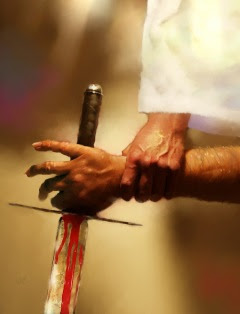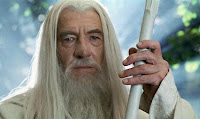I've experienced a time when I've started to notice the waters are lapping at my feet. There is no threat in this for me, I just feel that I'm entering a phase where change is afoot. I think it all started rougly after a home group meeting, where I'd spoken to a friend and highlighted some of my grievences and my own dissatisfaction both with them and my own contribution to them. To my perception t seems that some of the classic damage I've taken in the past has led me to me throwing up a few robust defecnces. Some of these are understandable. Given my past decisions and the fact it took a case of divine intervention to snap me out of it and give me the courage to break away... I'm cautious in regards to leaving myself exposed to the same weaknesses that led to my earlier downfall. However that hasn't stopped me from throwing up my own set of "Excalibur tests" for good measure.
I think that night at home group was a way of setting the scene - a reminder of the state of play as it has stood.
A couple of weeks later, I was due to preach om Isaiah 42, and I chose to use the paternal/maternal instincrts of the eagle as my theme. In truth this has been something that had been close to my heart for many years... and it just seemed to fit naturally to the theme (it was Trinity Sunday), In short, I portrayed the Trinity in terms of the Father being the parental eagle watching over us, the Son being the first born eagle that has tasken flight and shows us the where to go and how we grow to go in that direction, and the Spirit as the breeze that lifts the chick when the time is right... to give it the courage to take the step offThings have taken an interesting turn of late. the ledge. One of the points I made to the congregation was that if we are the chick in the nest, there is no wrong in wheat place we find ourselves. We might need to see where Jesus has led us before going... we may be waiting for the Spirit to empower us. We might feel that we have takemn a tumble and our ego is bruised... but the Father is able to pick us up and set us ready for another go when the time is right.
I didn't think too much about the implications of that last one for myself... then it happened.
An unexpected opportunity arose that on the face of things completetely terrified me. Somebody had posed me a scenario that completely blindsided me (I'm not going into detail here, as at the moment it is still live). My paranoia, mistrust and fear had kicked in and I went into automatic shutdown.
It took me a week to emerge from that state by which time it might be too late, but I wrote all my feelings down and got it out of my system - why I am the way I am and why I'm so reticent. Kind of hard to do that because nobody ever asks me about stuff like that... and maybe when I do offer a response (or perhaps because of that fact), they are just as uncomfortable about what comes out. However, I did leave my response with a positive end and the prosepect of hope.
Not long after this, I felt God was reminding me of an image from a book I'd read (Grail in Stephen Lawhead's Pendragon Cycle). In the book there is a low point where King Arthur has hit rock bottom and is in the doldrums - his sword has been stolen, his queen has been kidnapped and his trusted righthand man has apparently betrayed him. Following this scene, Merlin confronts the king and prophetically strikes the floor with his staff repeatedly and with each strike, he urges the king to shake off what drags him down and look to the state of play an, I got the feeling that God was rep0d encourages him - he needs to rise up and resolve the situation and not leave himself in this fitful sulk.
Likewise, I got the feeling that God was repeatedly striking my floor and telling me to get up and no choke myself on the past. For after all, past is merely prologue... and we are only doomed to repeat if we do not learn from it. I think maybe I've been overlearning it.
On TikTok I've recently come across a few posts with a sermon illustration about the painting "Checkmate". How the human player is in despair becasuse the devil player has seemingly won. The anecdote in the TikToks talk is basically that the king has one last move to make and the human player is saveable. Now I've read up on the painting and apparently the literal anecdote isn't true because its hard to tell what the pieces in it resemble on the board. However the moral is true... because the same could certainly be said of the devil's pieces. If we can't see how he's got checkmate, then I would argue his position is not a dead cert either. I think the truth behind that painting is that it is a character study. The man who thinks he is losing has given in to his fears and is accepting the devil at his word. But the thing is that the devil is a confidence trickster. He doesn't have checkmate - he's never hadd checkmate, but his sole objective is to terrify you and bluff you intop thinking he has. Never remove yourself from the game - listen to God's encouragement and accept his guidance and it is never over until God says it is over.
So anyway, a week has passed since all that happened... but confronted about my own sense of checkmate... I feel like I'm clawing my way back and have got a renewed sense of positivity. Whatever happens, I've learned not to retreat and cave on the broad stroke theme of this lesson. Yes, the specific circumstance may not pan out... I may lose another piece... but I will not allow the devil to put so much emphasis on that piece... I'm going to push on his king instead. In good time and God's grace, I have faith that the landscape will change. Whatever major pieces of lost, I have a fistful of pawns.... and they are only a step away from becoming knights, rooks, bishops and who knows, even a queen.
This morning at church we wee reading Genesis 22 - God's testing of Abraham. We were asked in the sermon what things that we might be holding onto that God might be asking us to let go of. My heart at this point was drawn to an exchange from Babylon 5... because I was thinking there wasn't much I could add to the conversation... and God was reminding me otherwise:
Marcus Cole : You asked me to give something up, Delenn. I don't have anything left. It's all gone. My brother was the last of our family and he died because of my stupidity. He warned me of the Shadows; I didn't listen. And when they came, I lost, him, our home, the colony where we'd grown up, a woman I was quite fond of. I escaped with only the clothes on my back, and went off in search of these "Rangers" that he'd been going on about. Because he believed in them, and in you. Everything I was, everything I had, all of it, died that night. I don't have anything left to give.
Delenn : Then that is exactly what you must give up. Yes, you have lost much, endured much, sacrificed greatly. But you cling to the memory of your sacrifices, of all the things you have lost or left behind. They drag behind you, like chains of your own making. They can have a terrible power over you, Marcus: the power of grief, and loss, and regret. Yes, you have let go of the people, places and things, but you have not let go of the pain. You have not forgiven yourself.
Delenn : Being alive
There it was again, God's not going to let this go... he's not going to let me go either. It's down to me to rise up from the ashes and have faith that he's going to remove the dead weight that has held me in check. All I need to do is to take courage and stand upon the rock. The only thing that stand between a vibrant pridelands filled with life and the current perceived state of affairs, is a roar!










